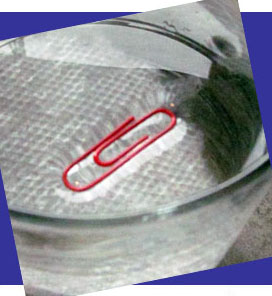
Playing with science projects are a great way to spend the afternoon with your preschooler. Science for younger kids doesn’t have to be complicated or unsafe. There are plenty of age appropriate science activities. Here Daniel Clark, owner of Geek Dads Weekly shares a fun preschool science project you can do right at home.
She Blinded Me With Science! Science!
My daughter, Winter, is four. Like most (if not all, it seems) girls her age, she really likes princesses, pretty gowns and dresses, My Little Pony and Barbie. She owns many, many Barbie movies, Disney princess videos, and more related toys than I can shake a stick at.
Winter is a girly-girl in every sense of the phrase, and there’s nothing wrong with that. Her mother and I aren’t worried about it because while she’s definitely into what she’s into, she’s also a very curious child. We don’t feel that she’s pigeonholing herself into the shallow fashionista mold. Besides, she can name all the main heroes in the Justice League and Teen Titans, and knows that Sinestro wears the yellow power ring, so as a comic book geek, I can’t complain.
Still, the whole princess thing can wear a little thin, and she’s of an age where we can really branch out into exploring new areas beyond mass media and toys. Enter: science!
Let’s Experiment: the Floating Paper Clip
Here’s a science experiment to blow the mind of a four-year-old.
- water
- a clear glass or plastic cup or some other shallow vessel
- a small piece of paper. Optionally, a piece of newspaper or paper towel.
Create it
- Fill a cup or shallow vessel with water.
- Ask your child what he or she expects to happen when you place the paper clip on the surface of the water. Logically, it should sink, right?
- Demonstrate that the clip will actually sink by placing it on the surface of the water, not perfectly flat, and letting go.
- Retrieve the clip and wait for the water to settle and be still.
- Now, place the clip on the surface of the water, as flat as possible, very, very gently. The paper clip might float for you at this point, if the water is very still, the clip is very flat (parallel to the water) and you let go very gently. If it sinks, go to step 6.
- Cut a small piece of newspaper or paper towel and put the clip on the strip. Place the strip with the clip on the surface of the water and let go. The paper will keep the clip afloat, but once the paper soaks up water, it will sink, leaving the clip floating on the surface of the water.
The paperclip floats because of surface tension, which you can read more about on Wikipedia or a variety of science-related websites.
Winter was amazed by this experiment. It was the first that we tried from a science kit that I bought at the local Fry’s Electronics here in Houston. Kits like the one that I bought are fantastic. They will provide weeks of educational fun at a very, very reasonable price. The one I chose was less than twenty-five dollars and had instructions for dozens of experiments along with the supplies needed to perform each one. Some common household items are needed to round it out, but I’m talking about things like cups, water, dirt, scissors – truly common items.
Science kits are available for kids of all ages – the one I got for Winter said it was suitable for ages 5 and up. I’ve never put a lot of stock in age requirements or warnings. Winter is 4 and she really got into it and understood what she was being taught. The kits come in various sizes and with various price tags, so be on the lookout for one that’s right for you. They can be found at stores that cater to arts & crafts, electronics, or even stores like Walmart or Target. Of course, you can find them online, as well (often at prices that beat buying it locally).
Don’t wait until your kid is in school before introducing him – or her – to science. Kids love to be entertained, and what’s better than whipping a little education on them while they’re being entertained with science?
About the Author
Daniel M. Clark is the co-founder and co-host of Geek Dads Weekly, a podcast by and for geeks raising kids in a digital age. He lives in Houston with his wife, daughter and son.
